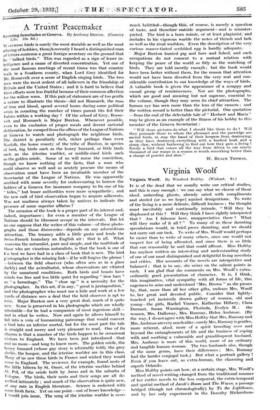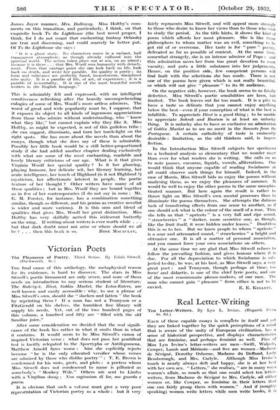Virginia Woolf Virginia Woolf. By Winifred Holtby. (Wishart. 63.) IT
is of the dead that we usually write our critical studies, and this is easy enough : we can say what we choose of those aloof, unheeding ghosts, already sated with compliments and steeled (or so we hope) against denigration. To write of the living is a more delicate, difficult business ; the thought must inevitably and continually intrude, " Will they be displeased at this ? Will they think I have rightly interpreted that ? Am I fulsome here, unappreciative there ? What will they make of it all ? " To many of us_ these daunting speculations would, in brief, prove daunting, and we should not carry out our task. To write of Mrs. Woolf would perhaps be easier than to write of many others, since one would not suspect her of being affronted, and since there is so little that can reasonably be said that could affront. Miss Holtby has anyhow written an interesting and understanding study of one of our most distinguished and delightful living novelists and critics. Her accounts of the novels are interpretive and balanced ; that is to say, she seizes on the salient points in each. I am glad that she comments on Mrs. Woolf's extra- ordinarily good presentation of character. It is, I think, this imaginative, vital sympathy with all forms of life, this eagerness to seize and understand "Mrs. Brown " as she passes by, that, more than all her other gifts, endears Mrs. Woolf to. her great and devoted public. Consider that lightly- touched yet incisively drawn gallery of women, old and young—the girls, Rachel Vinrace, Katherine Hilbery, Clara Durrant, Susan Warrington, Florinda, Evelyn M. ; the women, Mrs. Dalloway, Mrs. Ramsay, Helen Ambrose. (By the way, I do not agree with Miss Holtby that Mrs. Ramsay and Mrs. Ambrose arevery much alike ; surely Mrs. Ramsay is gentler, more reticent, aloof, more of a spirit brooding over and beyond the entanglements of life and the business of coping with and soothing a vulnerable and grandiloquent husband. Mrs. Ambrose is more of this, world, more of an ordinary and tangible human woman. The two husbands also, though of the same genus, have their differences ; Mrs. Ramsay had the harder conjugal task.) But what a portrait gallery Even if you leave out, as extra-human, the charming and superb Orlando. Miss Holtby points out how, at a certain stage, Mrs. Woolrs method of novel-writing changed from the traditional manner of her earlier novels to the less corporeal, the extra-tempOral and spatial method of Jacob's Room and The.Werves, a passage - bridged (though not chronologically) by To the Lighthouse, and by her only experiment in the Dorothy Richardson-' James Joyce manner, Mrs. Dalloway. Miss Holtby's com- ments on this transition, and particularly, I think, on that exquisite book To the Lighthouse (the best novel proper, I think, for I do not count that enchanting fantasy Orlando) are true and discerning, and could scarcely be better put.
Of To the Lighthouse she says : " It is a ghost story. Its characters move in a radiant, half transparent atmosphere, as though already suffused into the spiritual world. The action takes place out at sea, on an island ; because it is there . . that Mrs. Woolf sees humanity with detach ment. From that vantage point she can look back on life, look back on death, and write her parable. Its quality is poetic ; its form and substance are perfectly fused, incandescent, disciplined into unity. It is a parable of life, of art, of experience ; it is a parable of immortality. It is one of the most beautiful novels written in the English language."
• This is admirably felt and expressed, with an intelligent
sensitiveness refreshing after the heavily uncomprehending eulogies of some of Mrs. Woolf's more artless admirers. The worst of great and wide popularity must be, I suppose, that it exposes its object to all kinds of ingenuous appreciations from those who admire without understanding, who " know what they like," but cannot explain why they like it. Miss Holtby, as might be expected, is not of this guileless tribe ; she can suggest, illuminate, and turn her torch-light on the right spots. She has more about the novels than about the essays, though what she does say of these is admirable.
Possibly her little book would be a still better-proportioned study if she had added another chapter dealing exclusively with what are some of the most enchanting, readable and lovely literary criticisms of our age. What is it that gives Virginia Woolf her special quality ? Is it her glancing, playing humour, her delicate wit, her literary learning, her acute intelligence, her touch of Highland (is it not Highland ?) mysticism; her affectionate interest in people, the poetic . texture of her thought ? Other writers have many ,of all these qualities ; but in Mrs. Woolf they are bound together as in few of her contemporaries (I do not say in none ; Mr. E. M. Forster, for instance, has a combination something similar, though so different, and his genius as creative novelist is wider and more various). It is this sum and blend of qualities that gives Mrs. Woolf her great distinction. Miss Holtby has very skilfully netted this iridescent butterfly on the wing. If writing about writers is ever worth while . . . but that dark doubt must not arise or where should we all
be ? . . . then this book is so. ROSE MACAULAY.













































 Previous page
Previous page